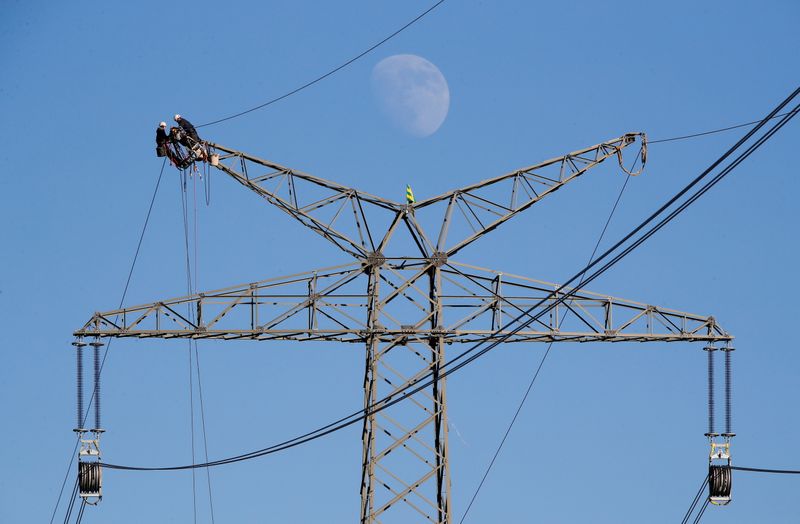By Nina Chestney
LONDON (Reuters) - Households across Europe face much higher winter energy bills due to a global surge in wholesale power and gas prices and consumer groups have warned the most vulnerable in the region could be hit by fuel poverty as a result.
WHY THE HIGH PRICES?
Energy companies pay a wholesale price to buy gas and electricity, which they then sell to consumers. As in any market, this can go up or down, driven by supply and demand.
Prices typically rise in response to more demand for heating and people turning lights on earlier in winter, while those in the summer period are usually lower.
But prices have sky-rocketed due to low gas storage stocks, high European Union carbon prices, low liquefied natural gas tanker deliveries due to higher demand from Asia, less gas supplies from Russia than usual, low renewable output and infrastructure outages.
Benchmark European gas prices at the Dutch TTF hub have risen by more than 400% since January, while benchmark German and French power contracts have more than doubled.
HOW LONG COULD THIS LAST?
Europe's winter heating season typically begins in October and wholesale prices are not forecast to fall significantly during the remainder of this year, despite promises from some suppliers of more gas.
Many analysts expect prices to remain elevated next year.
Russia, Europe's largest gas supplier, said this week that the certification of the Nord Stream 2 undersea gas pipeline from Russia to Germany, which expects clearance from a German regulator, could cool soaring European gas prices.
The regulator, which said in September it had four months to complete certification, said it could not rule out that Nord Stream 2 operations could start soon, adding that all technical requirements had been met.
But Gazprom (MCX:GAZP)'s ability to supply more volumes to Europe could be limited this winter as it is still filling its own domestic gas storages and already producing close to a 10-year high, said analysts at Bank of America (NYSE:BAC).
Last month, Norway's Equninor (EQNR.OL), Europe's second largest supplier, said it would increase natural gas exports to Europe. Norway supplies just under a third of Britain's gas.
WHY RETAIL PRICE RISES?
Many energy suppliers announced hikes to retail tariffs in recent months, passing a higher wholesale cost on to consumers.
Wholesale costs can make up a large chunk of a bill. In Britain, for example, on a dual fuel bill (electricity and gas), the wholesale cost can account for 40% of the total.
So when wholesale market prices rise significantly, suppliers can hike consumer retail tariffs.
(Graphic: What makes up a UK household dual fuel bill?: https://fingfx.thomsonreuters.com/gfx/ce/klpykerqqpg/Pasted%20image%201628230995436.png)
Suppliers can buy energy in the wholesale market on the day of delivery, a day ahead and up to months or seasons in advance.
They have to try and predict when the price will be cheaper and buy the right amount to cover their customer needs.
If suppliers do not buy enough energy, they might have to buy more at a price which could be higher, depending on market movements. This year, prices have kept on climbing all summer.
CAN ANYONE INTERVENE?
European Energy Commissioner Kadri Simson has said she would soon present a plan to overhaul the EU gas market.
One of the ideas, proposed by Spain, is for the EU to buy gas jointly to take advantage of the power of its single market of 450 million consumers and create a strategic EU gas reserve but details are scant on how that would work.
Some national governments have announced measures to try and ease the winter burden on households, such as subsidies, price caps or redirecting energy company profits to consumers.
Britain, which relies heavily on gas for heating, introduced a price cap on the most widely used energy tariffs in 2019 aimed at ending what former Prime Minister Theresa May called "rip-off" pricing.
However, Britain's energy regulator Ofgem has raised the cap on the most widely used tariffs, called standard variable tariffs, by 12-13% from October. It said on Friday it expects a "significant" rise of the cap again next April.
Proposals for UK government intervention have included state loans and the creation of a "bad bank" to support energy suppliers, as well as a windfall tax to help ease the burden on household bills.
"It is, however, unclear how any of such proposals could be implemented and what their impact on the industry would be," said Moody's Investor Service.
WHAT CAN CONSUMERS DO?
Due to a deregulated market, Britain has had some of the biggest choice in energy suppliers for consumers.
In a market of now around 40 suppliers, smaller firms have less capital to hedge their wholesale power purchases against soaring prices and nine firms serving over 1.7 million customers, or 6% of the market, have ceased trading since the beginning of September.
Consumers are usually encouraged to switch providers or to a cheaper tariff.
However, consumer groups in Britain now say standard variable tariffs, subject to the price cap, are among the cheapest as smaller suppliers fail and there are no longer cheaper deals available.
"But the cap level isn't the maximum anyone will pay. The price cap sets a limit on the rates you pay for each unit of gas and electricity, so if you use more, you'll pay more," said Andrew Capstick, energy analyst at price comarison website moneysupermarket.com

Regulators such as Britain's Ofgem urge consumers to contact their energy provider if they are struggling to pay their bills to explain when and how much can be paid.
Energy efficiency measures, such as improved insulation, energy efficient lighting and smart meters are also advised, but could require upfront costs. Reducing energy usage is much easier in the summer months.